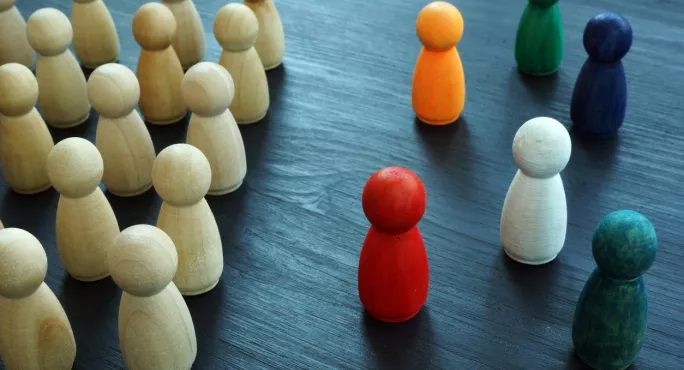- Home
- Why diversity matters - in our very non-diverse school
Why diversity matters - in our very non-diverse school

Norwich - and indeed Norfolk more generally - isn’t perhaps known for its diversity. But, to my mind, that’s all the more reason for us as a primary school to ensure that we are inclusive and welcoming of everyone. And we need to make sure that these aren’t just empty words, but instead full of purpose and action.
All of us in education have heard pupils speak unkind words - words that can wound deeply, and leave lasting scars for the recipient.
At Norwich Primary School, we’re no different from any other school in the country in that respect. In the past, we’ve had name calling and we’ve had unkindness. When I first started at the school, I was shocked to hear children calling each other “gay” as a joke, or calling each other inappropriate names, based on ethnicity or culture.
These words were used without understanding and often without malice, just as friendly teasing on the playground. It was immediately clear to me that these children needed a firm understanding of what they were saying and its impact.
Focusing on people’s differences
We wanted our whole school community to take a closer look at a range of issues - from equality of age, disability, gender reassignment, marriage and civil partnerships through to sex and sexual orientation, race, religion and beliefs.
In late June - when lockdown was in full swing - we organised a Diversity Week. Every day, we held virtual assemblies, where we read books about diversity, equality and inclusion, such as Something Else by Kathryn Cave and Ada Twist, Scientist by Andrea Beaty. We also timetabled diversity story time every day.
All pupils who were working from home had remote-learning packs delivered, containing a whole range of activities focused on diversity and inclusion, together with posters to place in their windows at home.
We also had core lessons every day that taught inclusion and equality areas for EYFS and for key stages 1 and 2. This included a lesson for our Reception children on Giraffes Can’t Dance, a book that focuses on people’s differences, and a lesson on heroes in history, which focused on Anne Lister, a lesbian landowner born in 1791, whom locals teased and called Gentleman Jack.
The most exciting part of the week, however, was being given the rights by Proud Canaries to launch and premier the Pride episode of LaGolda - a new prosocial cartoon series that follows the antics of an eight-year-old Latina who has been shuffled around from one orphanage to another in her native Colombia.
‘We are all human’
The feedback that we had from our pupils and their families has been incredible, and has spurred us on to do more. It is so wonderful to hear our pupils discussing equality, and making statements such as: “It doesn’t matter if you’re gay, white, black, whatever - we are all human”.
And as for the unacceptable language around skin colour and use of the word “gay”? Our children just don’t do this any more. We set up a conflict-resolution process: essentially sitting down the child who has used the unacceptable language with the child this language was directed at.
These conflict-resolution sessions are always very eye opening for both parties. The child who has used the inappropriate language is often very upset and shocked to find out the meaning of the words they used. We often have tears or stunned silence, followed by profuse apology and a determined explanation that this wasn’t what they meant.
After a full discussion about the meaning of the word, why the word was used in the first place, how each party felt at the time it was used, and how each child feels afterwards, more often than not the children are friends again. And, notably, we have never had the same language used again following a conflict-resolution session.
Many staff members often felt uncomfortable having these discussions. So our mentor team was offered professional development to help normalise these conversations and to show them how healthy the discussion was.
It’s OK to ask questions
This whole approach has allowed us to introduce a level of debate in school where it’s OK for children to talk about why certain words might be inappropriate. Some children were previously scared even to ask what a word meant. Now, it’s OK to ask, and it’s OK to question.
At the request of our student council, we now have a programme of guest speakers whom the children want to hear from, a buddy system for new children, to ensure that they are supported and feel part of our community, and a rewards policy that is truly inclusive and doesn’t just focus on the most academically able children.
We also think it’s important to share what we’ve learned and how we’ve gone about it with other schools in our trust - and, to that end, our vice-principal is giving a presentation to more than 1,000 staff across the trust, so that we too can explore and probe the challenges that we all face in this space.
Given the lack of diversity in Norfolk, many of our children will not have had direct experience of discrimination or prejudice, but it doesn’t mean that they can’t understand it. And it’s our job as educators to help them develop that understanding and act on it with kindness and respect.
Rebecca Handley Kirk is principal of Norwich Primary Academy, part of Inspiration Trust. Her school was recently named a Stonewall School Champion for its focus on diversity
Keep reading for just £1 per month
You've reached your limit of free articles this month. Subscribe for £1 per month for three months and get:
- Unlimited access to all Tes magazine content
- Exclusive subscriber-only stories
- Award-winning email newsletters